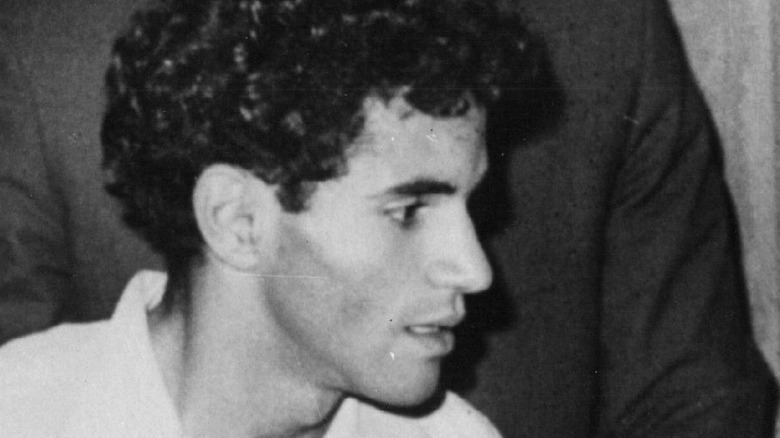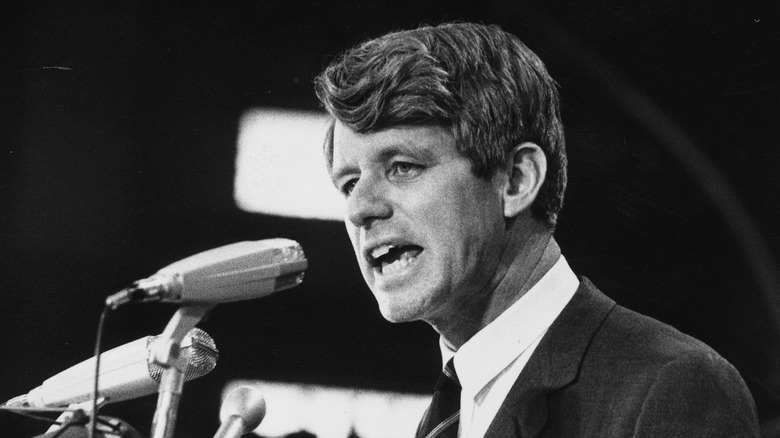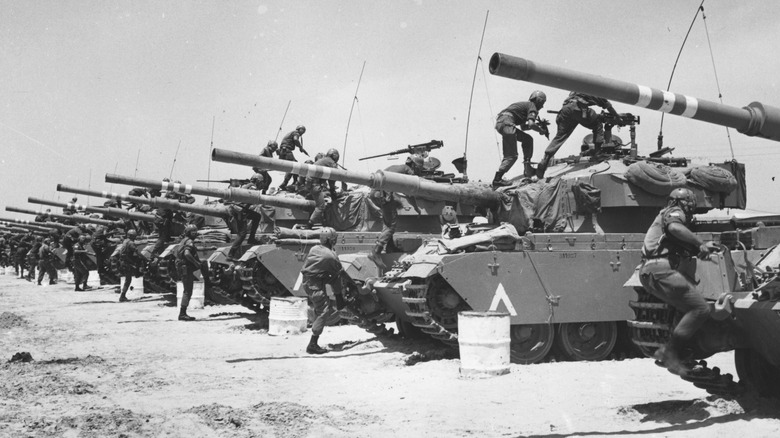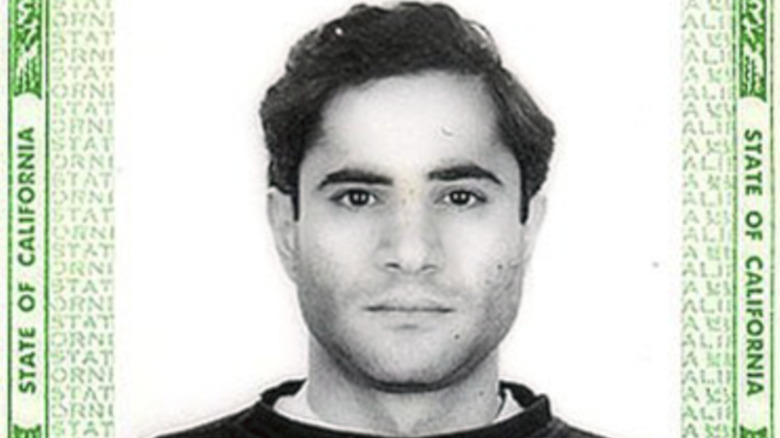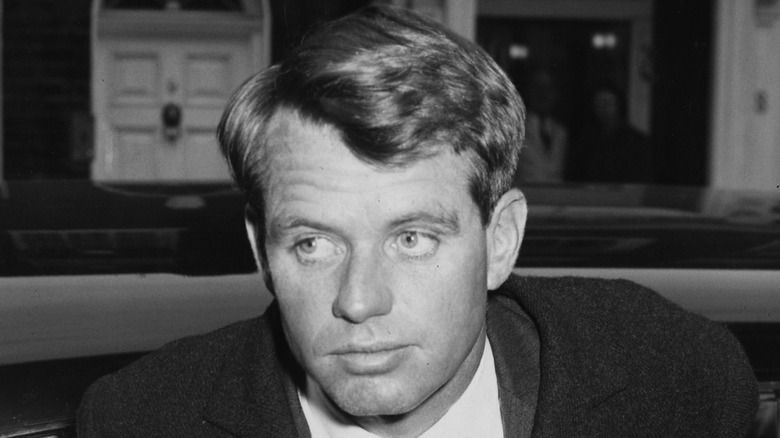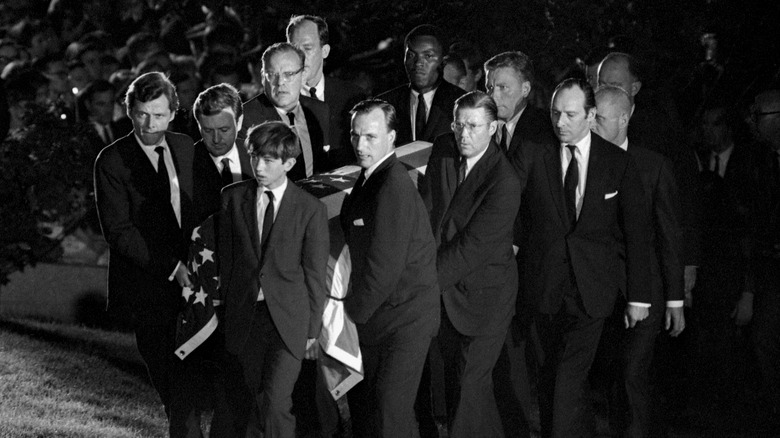The Untold Truth Of Sirhan Sirhan
In the early morning hours of June 5, 1968, Robert F. Kennedy (RFK) was making his way through the kitchen of the Ambassador Hotel (via ABC News). Located in Los Angeles, California, the Ambassador Hotel was playing home to Kennedy and staff for the 1968 presidential primary elections taking place in California. The junior senator for New York at the time, Robert Kennedy's star was clearly on the ascent. Younger brother to President John F. Kennedy, who was assassinated on November 22, 1963, Robert Kennedy's intent was to pick up where his older brother's work had ended. Unfortunately for Robert — and the world — his life would be tragically cut short, as well.
Born Robert Francis Kennedy on November 20, 1925, Robert was one of eight children born to Joseph P. Kennedy Sr. and Rose Fitzgerald Kennedy. A prominent businessman and politician hailing from Boston, Massachusetts, Joseph P. Kennedy Sr. — along with his wife Rose — began a lineage of politicians that is still very much prominent today. Much like his brother John before him, Robert Kennedy became active in politics at an early age. After leaving Harvard University to fight in World War II for the U.S. Navy, Robert returned to the states to finish his undergraduate studies and eventually received his law degree from the University of Virginia (via Britannica).
a Kennedy on the rise
On the other side of the world, meanwhile, Sirhan Bishara Sirhan was born. A Palestinian-born, but naturalized Jordanian citizen, Sirhan hails from what's now considered the West Bank (via Haaretz). During the '50s, amid all the ongoing Middle East conflict, Sirhan's family moved to Pasadena, California. While Sirhan attended high school and college in Pasadena, he continued to become radicalized against Israel. According to Britannica, Sirhan's radicalization accelerated with the conclusion of the Six-Day War in 1967. Per History, the Six-Day War was a conflict that occurred between Israel and several Arab countries that included Syria, Egypt, and Jordan. In June of 1967, Israel attacked Egypt and the surrounding Arab countries. In less than a week, Israel claimed territories from Egypt, Syria, and Jordan that included the West Bank, from which Sirhan hailed.
Throughout his years in politics, Robert Kennedy continued to support Israel. In June of 1948, Kennedy toured the country (via The JC). His imagination was captured by the Israeli plight in the region and Kennedy wrote several articles about his trip upon his return.
the six-day war
Sirhan Sirhan, meanwhile, was becoming increasingly agitated by the state of the Middle East. According to Britannica, Sirhan was very vocal about his opposition to Israeli tactics in the region. Perhaps agitating him the most? Robert Kennedy's continued support of Israel.
Even after the conclusion of the Six-Day War, Kennedy continued to lend his support to Israel while knocking its enemies in the region, stating in 1967, "We can welcome the United Nations' call for a cease-fire, but a cease-fire is not enough. We must deal with the causes of the conflict by ensuring a permanent and enforceable guarantee of Israel's right to live securely from invasion and free passage for ships of all nations through the Gulf of Aqaba and the Suez Canal" (via Tablet Mag). This infuriated the Palestinian-born Sirhan to no end. For him, Robert Kennedy had become the face of the oppressor.
the night of the primary election
When it was announced that Kennedy would be stationed at the Ambassador Hotel in Los Angeles for election night, which happened to be the one-year anniversary of the start of the Six-Day War, Sirhan made the decision to head on down to the hotel, or as The Jerusalem Post quoted him, to "go down there and see what they were up to." To make matters infinitely worse, Sirhan had spent most of that day riling himself up by firing a gun at a shooting range. The man was clearly agitated.
As the night of June 4 wore on, it was becoming increasingly clear that Robert F. Kennedy might win the Democratic presidential nomination. It has been contentious for awhile, however, with sitting Vice President Hubert Humphrey giving RFK a real run for his money early on. Eugene McCarthy, a senator from Minnesota, proved to be another rival for RFK during the primary. However, RFK finally surpassed his rival, defeating him by the slightest of margins in the South Dakota primary (via Oregon Live).
a man meeting destiny
Running high off the big wins, Robert Kennedy made his way to the Ambassador Hotel's Embassy ballroom to address the press and the crowd of supporters. According to ABC News, Kennedy was in a great mood, opening his speech by congratulating Los Angeles Dodgers pitcher Don Drysdale on his sixth straight shutout and even joking about his dog, Freckles. The speech, however, was also a serious one, covering topics like racism and Vietnam. Shortly after midnight on June 5, RFK wrapped up the speech to the cheering crowds. Kennedy was planning to make his way through the ballroom to head to another part of the Ambassador to address another growing crowd of supporters.
The scene in the ballroom was far too chaotic for Kennedy to make his way through. One of RFK's aids, Fred Dutton, made the decision to grab Kennedy and lead him through the Ambassador's kitchen (via The Hill). RFK followed along, shaking hands with cooks and busboys along the way.
hope shattered
After spending a good amount of time drinking at the Ambassador, Sirhan Sirhan continued to linger among the crowds and press that had gathered at the hotel (via The Jerusalem Post). Sometime during the evening, Sirhan made his way to the Ambassador's kitchen. As Fred Dutton led Kennedy through the kitchen lousy with journalists, RFK stopped to shake hands with busboy Juan Romero (via ABC News). As the men greeted each other, multiple shots rang out. Before anyone could realize what was happening, Sirhan Sirhan shot at Kennedy six times. Three hit the presidential hopeful, one of which hit him in the head. On June 6, 1968, at 1:44 a.m., Robert F. Kennedy was declared dead. He was 42. Five other people had been wounded, as well.
Sirhan Sirhan was arrested and found guilty of the assassination of RFK. On April 23, 1969, Sirhan was sentenced to death for the crime (via History) However, in 1972, Sirhan's death sentence was commuted to a life sentence when the state of California abolished the death penalty. After 53 years in prison, and currently 77 years old, Sirhan is now eligible for parole and the parole board has recommended on August 27, 2021, that he be released (via CNN). However, according to TMZ, the convict's parole isn't guaranteed. There still is a 150-day review period and the state's current governor, Gavin Newsom, has the right to overrule the parole board's decision at any time.
